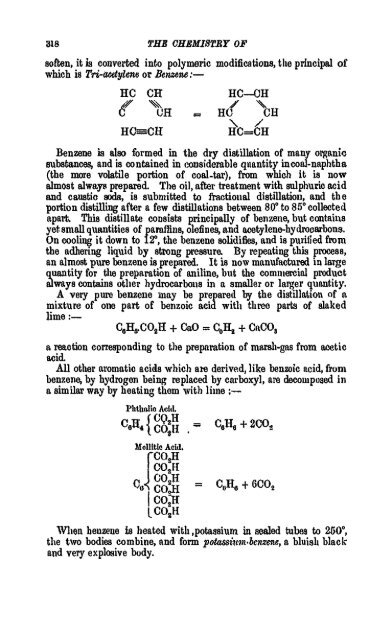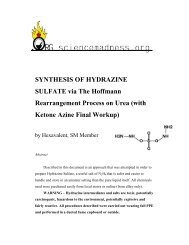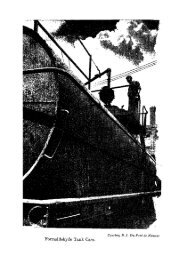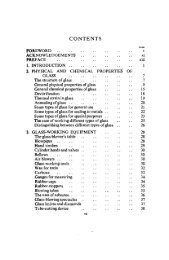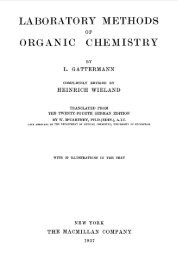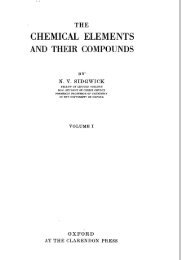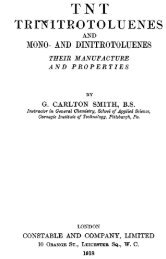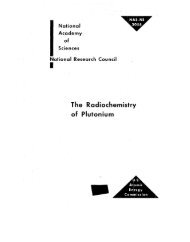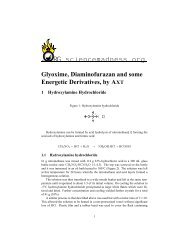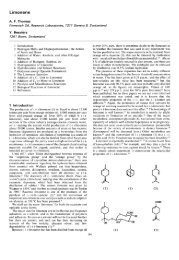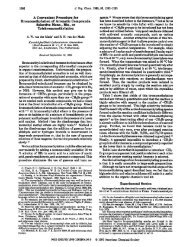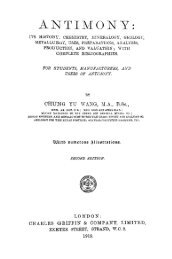- Page 1 and 2:
A MANUAL OF THE T H E C A R B O N C
- Page 3 and 4:
PREFACE. THE arrangement adopted in
- Page 5 and 6:
vfii C0NTENT9. PARAFFINSOB HYDROCAR
- Page 7 and 8:
x CONTENTS. FAI1B TKRPENES AND CAMP
- Page 9 and 10:
xii C0STJBNT8. PAGE COMPOUNDS CONTA
- Page 11 and 12:
8 THE CHEMISTBY OF both how to deco
- Page 13 and 14:
THE CHEMISTRY OF Eaoh molecule of t
- Page 15 and 16:
THE CHEMISTRY OF /Xi. Hypophosphoro
- Page 17 and 18:
TBB OSEMISTRY OF Series C Him. Seri
- Page 19 and 20:
10 THE CHEMISTRY OF two atoms of ch
- Page 21 and 22:
12 THE CHEMISTRY OF atoms of hydrog
- Page 23 and 24:
14 TBS CBEMIBTMY OF metal ahd methy
- Page 25 and 26:
16 THE CHEMISTRY OF point of the tu
- Page 27 and 28:
THE CHEMISTRY OF burned with fused
- Page 29 and 30:
in THE CHEMISTRY OF a mixture of ni
- Page 31 and 32:
23 TUB CHEMI8THY OF To find the vol
- Page 33 and 34:
THE CHEMISTRY OF The apparatus (Fig
- Page 35 and 36:
26 THE CHEMISTRY OF ignition 64*67
- Page 37 and 38:
28 THE CEKM.WTRY OF One molecule of
- Page 39 and 40:
30 THE CHEMISTRY OF acetic add bein
- Page 41 and 42:
32 THE CHEMISTRY OP Ohlomcotic AoM.
- Page 43 and 44:
34 Normal. CH3 CH2 CH8.OH Propional
- Page 45 and 46:
36 THE CHEMISTRY OF By comparing tl
- Page 47 and 48:
38 TUB CHEM1STBY OF In the series o
- Page 49 and 50:
40 THE CHEMI8TRY OF Boiling-point.
- Page 51 and 52:
42 THE CHEMISTJ17 OF Acetic Acid Ct
- Page 53 and 54:
U THE CHEMISTRY OF exist in two mod
- Page 55 and 56:
46 TEE CHEMISTRY OP In the flask re
- Page 57 and 58:
48 THE CHEMISTRY OF CYANOGEN COMPOU
- Page 59 and 60:
50 TEE CHEMISTRY OF By the inverse
- Page 61 and 62:
52 THE CEEMI8TRY OF The commeroial
- Page 63 and 64:
M THE CHEMISTRY OF animal matter. B
- Page 65 and 66:
56 TEE CHEMISTRY OF formed and a fe
- Page 67 and 68:
aft THE GHEU1STRY OP ifi water; thi
- Page 69 and 70:
00 THE CHEMISTRY OF cyanate with di
- Page 71 and 72:
62 TOM OMBMISTRY OF heated in seale
- Page 73 and 74:
64 THE CHEMISTRY OF refreshing tast
- Page 75 and 76:
66 THE CHEMISTRY OF consisting of p
- Page 77 and 78:
68 THE CHEMISTRY OF with a concentr
- Page 79 and 80:
70 TUB WBfflSTRY OF a salt wbiob is
- Page 81 and 82:
72 THE OUBMIStHY OF have been oalle
- Page 83 and 84:
74 THE CHEMISTRY OF among the paraf
- Page 85 and 86:
70 THE CHEMISTRY OF been known long
- Page 87 and 88:
78 THE CHEMISTRY OF Tetrethylammoii
- Page 89 and 90:
80 THE CHEMISTRY OF ethylamine and
- Page 91 and 92:
82 THE CHEMISTRY OF -S Etbyl Thiace
- Page 93 and 94:
84 THM CHEMISTRY OF CH8 CH8t CH, CO
- Page 95 and 96:
86 TEE OHEMTSTRY OF (2) SECONDARY A
- Page 97 and 98:
88 THE CHEMISTRY OF acid and dimeth
- Page 99 and 100:
80 THE CHEMISTRY OP CH8 CH, CH8 + N
- Page 101 and 102:
92 THE CHEMISTRY OF ~ 21°. It burn
- Page 103 and 104:
04 TEE CHEMISTRY OF Methyl CarbhnUe
- Page 105 and 106:
08 THE CHEMISTRY OF It is a colourl
- Page 107 and 108:
08 THE CHEMISTRY OF These componnds
- Page 109 and 110:
100 THE CHBMIXTRY OF On adding sodi
- Page 111 and 112:
102 TEE CHEMI8THY OF in sealed tube
- Page 113 and 114:
104 THE CHEMISTRY OF red-hot platin
- Page 115 and 116:
106 THE CHEMISTRY OF rhombic (CHO2)
- Page 117 and 118:
108 THE CHEMI8THY OF —100° it be
- Page 119 and 120:
lto TBS CUMMISTRY OP strong alcohol
- Page 121 and 122:
112 THE CHEMISTRY OF Diethylated et
- Page 123 and 124:
114 THE CHEMISTRY OF tained by pass
- Page 125 and 126:
116 THE CHEMISTRY OF duced by the a
- Page 127 and 128:
18 THE CHEMISTRY OF Ethyl Xanthate
- Page 129 and 130:
130 THE CHEMISTRY OF colourless liq
- Page 131 and 132:
122 THE CHEMISTRY OF was discovered
- Page 133 and 134:
124 THE CHEMISTRY OJP set free by m
- Page 135 and 136:
186 THE CHEMISTRY OF oily liquid, b
- Page 137 and 138:
128 THE CHEMISTRY OF mercaptan, thi
- Page 139 and 140:
130 THE CHEMISTRY OF fire in the ai
- Page 141 and 142:
132 THE CHEMISTRY OF Pb2Cl4 + 2Zn(C
- Page 143 and 144:
134 TBS CBJSMI8TRY OF trated sulphu
- Page 145 and 146:
130 THE CHEMISTRY OF C»H4O.CNH, wh
- Page 147 and 148:
133 TBE CHEMISTRY OF By dissolving
- Page 149 and 150:
140 THE CHEMISTRY OF at 187°, and
- Page 151 and 152:
142 THE CHEMISTRY OF If silicon tet
- Page 153 and 154:
144 THE CHEMI8TMY OF In a similar m
- Page 155 and 156:
146 TEE CHEMISTRY OF Chloral or Tri
- Page 157 and 158:
148 THE CHEMI8TRY OF SUBSTITUTION-P
- Page 159 and 160:
160 THE CHEMISTRY OF EROm-GROUP. Pr
- Page 161 and 162:
162 THE CHEMISTRY OF (1) CH,, CH, C
- Page 163 and 164:
164 TBE 0HEMI8TRY OF BUTYL-GEOOP. T
- Page 165 and 166:
166 THE CHEMISTRY OF Q*jr o* f G* +
- Page 167 and 168:
168 TEE CHEMISTRY OF The same cryst
- Page 169 and 170:
180 THE OHEMI8TRY OF described prim
- Page 171 and 172:
162 THE GBEM18TRY OF salt, one volu
- Page 173 and 174:
164 TEE CHEMISTRY Off- CH8 CH8 CH-C
- Page 175 and 176:
166 J'flE CHEMISTRY OF C H ) acetat
- Page 177 and 178:
168 THE CHEMISTRY OF HEPTYL GROUP.
- Page 179 and 180:
170 THE OBEMI8TRY OF of ocfcylic ac
- Page 181 and 182:
172 TEE CHEMISTRY OF £CUH3^S1]' is
- Page 183 and 184:
174 THE CHEMISTRY OP needles or lam
- Page 185 and 186:
176 THE CBEM8TRY OF Olefines may al
- Page 187 and 188:
178 TME CHEMISTRY OF ncids, forming
- Page 189 and 190:
180 THE OSEMI8TRY OF They ore also
- Page 191 and 192:
182 THE OHEMISTBY OF By employing t
- Page 193 and 194:
184 THE CHBMHTRY OF CO.OH CO.OH CH2
- Page 195 and 196:
186 THE CHEMISTRY OF From this tabl
- Page 197 and 198:
188 THE CHEMT8TKY OF horns pentachl
- Page 199 and 200:
100 THE CHEMISTRY OF Monoxotliylnni
- Page 201 and 202:
192 THE CUEMISUBT OF crystallizes o
- Page 203 and 204:
194 THE CHEMISTRY OP with silver ox
- Page 205 and 206:
196 THE CHEMISTRY OF When aldehyde
- Page 207 and 208:
198 TEE GKEMISTRY OJf CHg.OCjjHgO M
- Page 209 and 210:
200 THE CHEMI8TEY OF It is obtained
- Page 211 and 212:
208 THE GBEMISTHY OP water; in ibis
- Page 213 and 214:
204 THE CHEMISTRY OF Phosphorus oxy
- Page 215 and 216:
206 THE CHEMISTRY OF water and silv
- Page 217 and 218:
203 TEE CHEMISTRY OF UH2Br Trimethe
- Page 219 and 220:
210 THE OBEM18TRY OF + 3HJJO is pre
- Page 221 and 222:
212 TRB CHEMISTRY OF This etherific
- Page 223 and 224:
2U THB CHEMISTRY OF Ethene-lactic a
- Page 225 and 226:
216 THE CHEMISTRY OF 0H8 CH8 (1) CE
- Page 227 and 228:
218 THE CHEMISTRY OF Oxy-isobutyric
- Page 229 and 230:
220 THE CHEMISTRY OF the boiling-po
- Page 231 and 232:
222 THE CBEM18TBY OF OF SUCCINIC AC
- Page 233 and 234:
224 THE CHEMISTRY OF (C4H6O6)8Ca +
- Page 235 and 236:
220 THE OJlJSMiaTBY OF TABTAKIC ACI
- Page 237 and 238:
TEE CHEMT8TRY OF solution decompose
- Page 239 and 240:
830 THE CUBMT8TRY OF ganic substanc
- Page 241 and 242:
THE CHEMISTRY OF or butatanine (^^(
- Page 243 and 244:
234 THE CHEMISTRY OF ffeptene or Hc
- Page 245 and 246:
236 THE 0HEMI8TRY OF It crystallize
- Page 247 and 248:
238 THE CHEMISTRY OF Silver Citrate
- Page 249 and 250:
240 TBE CHEMIUTKY OF MmMbromopyrota
- Page 251 and 252:
242 THE CHEMISTRY OF TJBATBS, Uric
- Page 253 and 254:
244 THE CHEMISTRY OF Mesoxalic acid
- Page 255 and 256:
246 TBB CHEMISTRY OF ammonium hydur
- Page 257 and 258:
248 THE CEEMISTBY OF CH.gNH) EydaiU
- Page 259 and 260:
20l> THE CHEMISTRY OF CHEATING AND
- Page 261 and 262:
263 THE CEEMI8TRY OF also in the ko
- Page 263 and 264:
254 THE CHEMISTRY OF Glycerin was f
- Page 265 and 266:
258 THE CHEMISTRY OF produced by th
- Page 267 and 268:
258 TEE CHEMISTRY OF Monofai'min C8
- Page 269 and 270:
260 THE CHEMISTRY OF into /S chloro
- Page 271 and 272:
268 THE 0HEMI8TRY OF Dibroniopropyl
- Page 273 and 274:
264 THE CHEMIUTRY OF black mustard
- Page 275 and 276: 26B THE CHEMISTRY OF as always thos
- Page 277 and 278: 288 THE CHEMISTRY OF The same acid
- Page 279 and 280: 270 THE CMEMISTHY OF Mtthglcrotonk
- Page 281 and 282: 272 THE CHEMISTRY OF Stearoxylic Ac
- Page 283 and 284: 274 THE CHEMISTRY OF Hcxone Dibromi
- Page 285 and 286: £!» THE CHUMiaTRY OF Alii/hue or
- Page 287 and 288: 278 THE GSEUISTRY OF Erythrite form
- Page 289 and 290: 280 TEE CHEMISTRY OF Isodulcite CgH
- Page 291 and 292: TU&' GHEMISTRY OF PYROM0CIC ALDEHYD
- Page 293 and 294: 284 THE CHEMI8TBY OF prisms contain
- Page 295 and 296: 286 THE CHEMISTRY OF sugar containe
- Page 297 and 298: 2«8 TEE CHEMISTRY OF MELITOSK CBHM
- Page 299 and 300: 890 THE OEEMISTRY OF Dextrose forms
- Page 301 and 302: 293 2BJ? QHEMI8TR7 OF 0A.LACT08E Is
- Page 303 and 304: 894 TBE 0BEMI8TRY OF DEXTRIN. This
- Page 305 and 306: 298 THE CUBMISTBY OF fresh acid mix
- Page 307 and 308: 888 THE CHEMISTRY OF A small quanti
- Page 309 and 310: 300 THE CHEMISTRY OF Terpinol O^SJO
- Page 311 and 312: 302 THE OHEMI8T&Y OF to the right,
- Page 313 and 314: 304 1HM CHEMISTRY OF Hydrochloric a
- Page 315 and 316: 306 TBS 0BEMI8TRY OF OXIDATION-PROD
- Page 317 and 318: 308 ISE OHBMISTBY OF with water. By
- Page 319 and 320: 310 THE CHEMISTRY OF when acted upo
- Page 321 and 322: 312 THE CHEMISTRY OF TOWJENK, METHY
- Page 323 and 324: 3U TEE CBEMISTUY OF oxidation a mon
- Page 325: 316 THE CJUEMISTRT OF The first for
- Page 329 and 330: 320 THE GHMMJSTSY OF consists in th
- Page 331 and 332: 322 TEE CHEMISTRY OP fying at - 8°
- Page 333 and 334: 324 THE CHEMISTRY OF cyanvuic acid
- Page 335 and 336: 326 THE GRBMISVBY OF The nitrobenze
- Page 337 and 338: 328 THE CHEMISTRY OF produced by th
- Page 339 and 340: 330 THE CEEMI8TRY OB benzoic acid t
- Page 341 and 342: 332 TEE CHEMISTRY OF Phenol lias be
- Page 343 and 344: 334 THJB CHEMISTRY OF Phmyl Sulphid
- Page 345 and 346: 336 THE CHEMISTRY OJP water, and cr
- Page 347 and 348: 338 THE OMBMISTRT OF HALOID SUBSTIT
- Page 349 and 350: 340 THE 0BBMI8TRY OF Hydroquinone i
- Page 351 and 352: 342 TEE CHEMISTRY OF •warm potash
- Page 353 and 354: 344 THE CHEMISTRY OF oxygen from a
- Page 355 and 356: 346 THE CHEMISTRY OF action is over
- Page 357 and 358: 348 TEE CHEMISTRY OF More than seve
- Page 359 and 360: 360 THE OHEMISTBT OF toluene is for
- Page 361 and 362: 352 THE CHEMISTRY OF DIOXVTOLUKKfiS
- Page 363 and 364: 364 THE CMSMI8TBY OF BENZYL COMPOUN
- Page 365 and 366: 359 THE CHEMISTRY OF f Ttf IT Bmyl-
- Page 367 and 368: 3SS THE CHEMISTRY OF In these two l
- Page 369 and 370: 360 TBS CHEMISTRY OP (4.) When the
- Page 371 and 372: 362 TEE CHEMISTRY OF 2CeH6.CO.OHa +
- Page 373 and 374: 364 THE CHEMISTRY OF a Dichlorobenz
- Page 375 and 376: 368 TEE CHEMISTRY OF out in colourl
- Page 377 and 378:
THE GHEMI8TBY OF ( § ^ } fa formed
- Page 379 and 380:
3/0 THE CHEMISTRY OF Phosphorus pen
- Page 381 and 382:
372 THE CHEMISTRY OF By acting with
- Page 383 and 384:
374 THE CREMI8TBY OF pyrocatechin,
- Page 385 and 386:
376 THE CHEMISTRY OF isoxylene, by
- Page 387 and 388:
378 THE OBEMISTItY OP Paratoluonitr
- Page 389 and 390:
380 THE CHEMISTRY OP filtered solut
- Page 391 and 392:
382 THE CHEMISTRY OF When calcium j
- Page 393 and 394:
384 TEE CHEMISTRY OF is obtained by
- Page 395 and 396:
388 THE CHEMISTRY OF COMPOUNDS WITH
- Page 397 and 398:
THE CHEMISTRY OF Dibronwpseudocvmen
- Page 399 and 400:
300 TRE CHEMISTRY OP Ethytbmzoic Ac
- Page 401 and 402:
392 THE CHEMISTRY OF styrolene, and
- Page 403 and 404:
391 THE CHEMISTRY Off PHENYL-LAOTIO
- Page 405 and 406:
38ff TBE CHEMISTRY OF base and an a
- Page 407 and 408:
THE GBMMISTRY 09 VeraMc Add CgHjCOE
- Page 409 and 410:
4 THE CHBMIHTRY OF from oil of turp
- Page 411 and 412:
402 THE CHEMISTRY Of of hydrogen in
- Page 413 and 414:
404 TEE CHEMISTRY OP Mellitic acid
- Page 415 and 416:
406 THE OEBMI3TBY OF water is conve
- Page 417 and 418:
408 TSB OHEMISTMT OF powder, which
- Page 419 and 420:
410 TEE CHEMISTRY OF scale by heati
- Page 421 and 422:
412 THE CHBMI8THY OF Pare aurin is
- Page 423 and 424:
414 THE CHEMISTRY OF JSixin CjjHjaO
- Page 425 and 426:
416 THE CHEMISTRY OF Carbazol cryst
- Page 427 and 428:
418 TEE OEEMISTBT OF is formed by t
- Page 429 and 430:
420 THE CHEMISTRY OF chloride'over
- Page 431 and 432:
422 THE CHEMISTRY OF It crystallize
- Page 433 and 434:
424 THE CHEMI8TBY OF above 300°, a
- Page 435 and 436:
426 THE CRHMI8TRY OF soluble in wat
- Page 437 and 438:
428 THE CHEMISTRY OF TrioxinSd or I
- Page 439 and 440:
430 THE CHEMISTRY OF Naphthalene, t
- Page 441 and 442:
432 THE CHEMISTRY Off SUBSTITUTED N
- Page 443 and 444:
434 THIS CHEMISTRY OF fluorescence.
- Page 445 and 446:
436 THE CHEMISTRY OF trioxide in th
- Page 447 and 448:
43S TUB CHEMISTRY OF also been prod
- Page 449 and 450:
*W THE OHUMISTBY 01> a Dinaphthyl K
- Page 451 and 452:
442 TBB OHEMIHTBY Of acids. It crys
- Page 453 and 454:
444 THE CHEMISTRY OF HYDE0-ANTHBACE
- Page 455 and 456:
448 THE GBBMISTKY OF 273°, and sub
- Page 457 and 458:
4tS THE CHEMISTRY OF OXYANTHBAQUINO
- Page 459 and 460:
450 THE GHEMISTltY OF precipitated
- Page 461 and 462:
482 TRE CHEMISTRY OF with a crimson
- Page 463 and 464:
454 THE CHEMISTRY OF A 0 - 2H2 Dime
- Page 465 and 466:
488 THE CHEMISTRY OF RETENE vjjii,,
- Page 467 and 468:
•153 TBS CHEMISTRY OF Crude coal-
- Page 469 and 470:
460 THE CMEMI8TRY OF ferment of bit
- Page 471 and 472:
462 THE CHEMISTRY OF sugars, which
- Page 473 and 474:
464 TUB CHEMISTRY OP gallic acid or
- Page 475 and 476:
TEE CBBMI8TRY OF sweetish astringen
- Page 477 and 478:
468 THE 0REMI8TRY OF It forms a sul
- Page 479 and 480:
470 THE CHEMISTRY OF NATURAL BASES
- Page 481 and 482:
478 THE CHEMISTKY OF the cold, but
- Page 483 and 484:
474 TBE CHEMISTRY OF speedy vomitin
- Page 485 and 486:
470 THE CHEMI8TKY OJ" Gryptopine C^
- Page 487 and 488:
478 TEB CE£MISTRY OF The most impo
- Page 489 and 490:
480 THE OHEiliaTBY OF little sulphu
- Page 491 and 492:
482 THE VHBMISTRY OF Piperonaldehyd
- Page 493 and 494:
484 THE OUEMISTKY OF when impure po
- Page 495 and 496:
486 THE CHEMI8TBY OF definite compo
- Page 497 and 498:
THE OJIEMISTMY OF COMPOUNDS CONTAIN
- Page 499 and 500:
490 TME CHEMISTBT OF dissolving in
- Page 501 and 502:
402' TBE OftEMISTMY Off aspartic ac
- Page 503 and 504:
494 THE CHEMISTRY OF Htemaglobin co
- Page 505 and 506:
490 THE CHEMISTRY OF with water. Th
- Page 507 and 508:
498 THE CHHMI8TBY OF THE CARBON COM
- Page 509 and 510:
600 INDEX. Acid, oltramonoobloropyr
- Page 511 and 512:
602 Aoid, sulphocarbonio, 68 Aosoul
- Page 513 and 514:
m INDEX. Cuein vegetable. 4P2 Cellu
- Page 515 and 516:
506 Ethine-naphthabne, 48S Ethinyl-
- Page 517 and 518:
608 LeYobom&ol, 808 Levulosan, 291
- Page 519 and 520:
610 INDEX. Perchloretbyl osido, 112
- Page 521:
612 INDEX. Tribromacetyl-urea, 217


